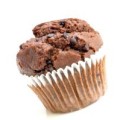These days when we think of muffins, we tend to think of the North American version, usually blueberry, banana, or bran and they are found everywhere! Coffee shops, supermarkets, and of course, bakeries. I think part of the reason why these pint-sized cakes are so popular is that they are versatile in their ingredients and very easy to eat "on-the-go" for a quick breakfast or snack in the middle of the day. The term muffin is thought to have come from an old French word, "moufflet," meaning 'soft', when referring to bread. There are references to English muffins as early as 1747 when the first recipes appeared in print, but they enjoyed most of their popularity during the nineteenth century. During Victorian times, muffin men would carry trays of muffins balanced on their heads through the streets at teatime, ringing a hand bell to draw attention to their goodies. These English muffins were cooked on a griddle and were flat on the top and bottom and usually in need of butter and jam as they were quite plain in flavour.
No one is entirely sure when the muffin migrated across the Atlantic, but there is no doubt it went through many changes in doing so. North American style muffins are a type of quick-bread, which means their main raising ingredient is baking powder or baking soda and they are cooked in an oven instead of on a griddle. Muffins are actually more like small cakes, but usually not as sweet. Muffin tins are used to bake the batter in and give muffins their distinctive shape. They vary in size depending on how big you want your muffins to be, but the standard sized tin has 12 cup-shaped depressions in it.
The possibilities are endless when it comes to making muffins. They can range from an extremely healthy, low fat, high fibre variety, to a sweet and buttery little morsel with chocolate pieces. They can contain fruit, nuts, plain white flour, whole wheat flour, oats, bran, you name the ingredient, and you can probably add it to a muffin mix. Here is a deliecious, moist, and healthy recipe for banana muffins you can try out at home.
For Banana Muffins, the ingredients and amounts you will need are: 1 Cup of mashed ripe bananas ( or about 2 medium bananas ) 1 Tsp. baking soda Cup plain, low-fat yogurt Cup vegetable oil Cup packed brown sugar 1 egg 1 Tsp. vanilla 1 Cup white flour Cup whole wheat flour (if you don't have whole wheat flour you can substitute plain white flour, as long as your flour totals 1 Cups, it doesn't matter what type you use) 1 tsp. baking powder 1 tsp salt First, combine your mashed bananas, yogurt and baking soda and let sit 5-10 minutes while you prepare the rest of your ingredients. Next, in a separate bowl, combine well the oil, sugar, eggs and vanilla. Then, in another separate bowl or measuring cup, combine all of your dry ingredients, the flour, baking powder and salt.
Stir the bananas into your oil, sugar mixture until well combined and then add your dry ingredients into that. Stir until just combined. It's important to not over-stir as it knocks the air out of your batter and will result in a heavier, more dense texture. Lastly, pour your batter about of the way up a non-stick muffin tin. If you don't have a non-stick tin, you can use paper muffin cups to line the tin, or grease and flour each individual mold. Bake at 350 degrees for 15-20 minutes, until muffins are slightly firm when the top is touched.
Allow to cool and enjoy!

